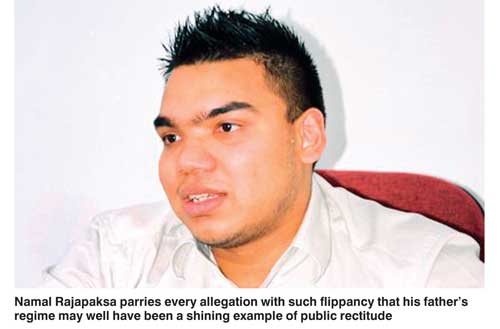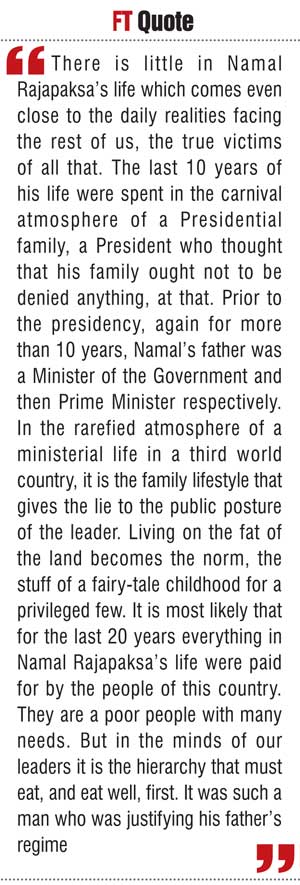Monday Feb 16, 2026
Monday Feb 16, 2026
Saturday, 27 August 2016 00:00 - - {{hitsCtrl.values.hits}}
Namal Rajapaksa, Member of Parliament, the eldest son of former President Mahinda Rajapaksa, was interviewed recently on television. By and large the tone of the lengthy interview, nearly two hours in duration, was defensive, an attempt at validating a period characterised by the most vulgar form of family rule seen in this country since independence.
Unlike what was the norm when his father ruled, the panel of interviewers, considering that before them was one of the most powerful as well as controversial men of that era, were fair, but probing. But the young Rajapaksa was unperturbed, glib and facile.

Language of politics
There is the language of politics; so well mastered even at this young age. Every allegation is parried with such flippancy that his father’s regime may well have been a shining example of public rectitude. They are in politics only because of their overflowing affection for the people. Those older than him are invariably elder brother (aiya) or elder sister (akka) and if younger, referred to as younger brother/sister (malli, nangi) or if much younger, even son or daughter.
Anyone of an older generation becomes an uncle or aunty, if not “father” or “mother”, in reference to the person’s role in his/her own family. Coming from our young Member of Parliament, this is a cynical joke, because the Rajapaksas proved during their reign that they have no difficulty in identifying who their real family are, own brothers, cousins, nephews, uncles and so on, and the difference between them and the rest, if it can be measured with access to money, to be counted only in Billions of rupees. For the rest, there is always the concession, “brother, sister, father, mother…. listen”.
We were not voted out by popular choice, but were the victims of a vast international conspiracy. Astrology/occult is the hobbyhorse of everyone, why is only my father singled out? Night races help tourism (the venue immaterial?) We did not interfere in the infamous rape/murder case in Tangalle; in fact the due process was followed to the letter in that case. Some of those who are associated with me in private companies were not long-term friends. They may have even been ushers at Temple Trees. We are generous by nature and go all out to help those requesting our assistance. Yes, there was a law firm in my name, but I was only a junior lawyer there. All the legal work came to the firm based only on our proven legal skills. We do not make money by unfair means. I am a vegetarian.
When the young man ventures into larger issues; the constitution, the evolution of parliamentary politics in the former colony, the country’s economy, our foreign policy, desired standards in public life the viewer is left with a sense of unease. These are vast and complex subjects, areas that angels would fear to tread. This is a pampered young man out of his depth here.
Fairy-tale
There is little in Namal Rajapaksa’s life which comes even close to the daily realities facing the rest of us, the true victims of all that. The last 10 years of his life were spent in the carnival atmosphere of a Presidential family, a President who thought that his family ought not to be denied anything, at that.
Prior to the presidency, again for more than 10 years, Namal’s father was a Minister of the Government and then Prime Minister respectively. In the rarefied atmosphere of a ministerial life in a third world country, it is the family lifestyle that gives the lie to the public posture of the leader. The spoilt brats of Kaddafi of Libya, Saddam Hussein of Iraq, Suharto of Indonesia and Mubarak of Egypt are examples that need no further elaboration. Living on the fat of the land becomes the norm, the stuff of a fairy-tale childhood for a privileged few.
It is most likely that for the last 20 years everything in Namal Rajapaksa’s life, the houses, cars, the clothes, the food, drivers, servants, bodyguards were paid for by the people of this country. They are a poor people with many needs. But in the minds of our leaders it is the hierarchy that must eat, and eat well, first. It was such a man who was justifying his father’s regime.
“Helping” his friends
For the sake of argument let us take the point that Namal Rajapaksa makes about “helping” his friends. Someone does not go to the son of the President for a simple favour like a ride in a car or a one thousand rupee loan. These supplicants come to him for favours with appointments to the public service, tenders, contracts, licenses, registrations, inquiries, trouble with the police, arrests and such like.
When an influential person like Namal intercedes on behalf of a “friend”, it is obvious that there are hundred others who don’t enjoy that privilege. Clearly, it is an interference with the due process. During the Rajapaksa regime, every wish of a Rajapaksa was an edict from the high. To this young man, his selective interference on behalf of “friends”, the consequent denial of a level playing field to thousands, the undermining of the integrity of the system: was neither corruption, nor an abuse of power.
The Rajapaksa regime underlined the evil of family rule. Its justification by the privileged son was both ignorant as well as banal, ultimately only proving the indefensibility of family politics. It is a corruption that cannot co-exist with the principles of good governance.
But now that regime is no more. But, sadly, on 8 January 2015, nepotism did not die. The cultural inclination and the thinking that led to Rajapaksa family politics, is very much alive.
Shameful badge of South Asian politics
Save for a few exceptions, the family has come to be the shameful badge of South Asian politics. Father to son, mother to daughter, brother to brother, is even boasted of, a kind of a political caste, a specialised skill running in the bloodline. The family members contend that they are elected and therefore justified. Although broadly taken this may be true, when we get down to the specifics; the cultural inclinations, immaturities of the electorate, the poverty of the country and perhaps even the overall level of intelligence – the weakness of the argument become apparent.
Young drug addicts take their poison voluntarily. Those cunning drug pushers, who used the immaturity of the youth to hook them into their destructive habit, stand condemned forever. It will not be heard in their defence that the youngsters took the drug voluntarily. Besides, as the political party is in the firm grip of their father, the voter has to either vote for the son he nominates or vote against the party. Free choice is not always that free.
For the moral corruption that family politics encourages there cannot be a better representation than the photograph that appeared in a newspaper some years back. An old professor, a self-proclaimed nationalist, was seen kowtowing to the young “prince’ at a cultural festival. Many, otherwise decent, educated persons, felt compelled to behave in such a humble manner in their presence. That is the curse of family politics.
Behind the posturing and the high slogans there is always the ignoble, personal enrichment, in wealth, status and if nothing else, social mobility. Politics in our society is a lifetime career with very little downside to it, no risk of impoverishment there. On the contrary, the more the man serves, the richer he gets! Many of the extended family of local politicians are domiciled overseas, enjoying life in advanced countries, and return only when their man is elected to power in the native country, to walk in to high appointments. And, whatever they earn here again is remitted to their country of domicile, to enjoy an even better life.
Political appointments
It is the prerogative of the politician to appoint whoever he wishes to whatever position, they argue. The fact that the politician is elected only for short-term tenure holds public office, deals with public assets and spends public money, does not bind them. Having no real ideology or principle in their politics, personal enrichment in one form or the other is their overriding concern.
The only criterion for appointment is craven loyalty to the person of the politician. And he will appoint the most trusted- his relatives, to the plum jobs, the desired positions. Sometimes these appointments are just a method of cementing family ties, a gesture of affection. The appointee, by his incompetence or unsuitability, may cause losses in the millions to the country or disgrace the office he holds, diminish its stature or violate its constitutional basis. Yet the politician is rarely held to account, the vast majority of the people blissfully unaware of the repercussions and the ramifications of the appointment.
But while the woeful entrances and the exits of these poor players on our public stage goon, there is the more permanent factor; the long-suffering nation, the much-wronged country. Every time a politician appoints a relative to public office we cry in mute despair, angry and frustrated.
But increasingly, it seems like a cry of the hopeless.